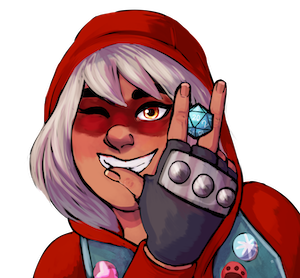Safety and Calibration tools
 Sometimes a game can go in an unexpected direction, or explore difficult subjects, and situations or topics may come up that causes players to feel uncomfortable, scared, or even trigger memories of traumatic events.
Sometimes a game can go in an unexpected direction, or explore difficult subjects, and situations or topics may come up that causes players to feel uncomfortable, scared, or even trigger memories of traumatic events.
Here are some mechanisms that promote clear communication to help avoid these situations and give players tools to address them when they occur. Even if these tools are never used, it often puts players at ease to know that everyone in the game is committed to having a good experience at the table.
Not all of these techniques are appropriate for every type of game, so consider which one or more will work best for you.
If a GM chooses to use one of these tools, please let the players know at the beginning of the game, and model and practice them as a group.
We've also included a PDF that you can download for easy reference!
X-Card
Because of the improvisational nature of rpgs and larps, we don't always know what will happen until it happens. The X-Card, created by John Stavropoulos, allows anyone (including the GM) to edit out content mid-game, and resolve issues as they arise.
- Place a card with an "X" on it somewhere on the table where everyone can reach it.
- Anyone can tap or hold up the X-Card mid-game, and the group will edit out the scene's content, no questions asked.
More information on the X-Card can be found here.
Want to ask a question about the X-Card? Contact John Stavropoulos.
Lines/Veils
We all have our limits and boundaries. Lines and veils are different ways to handle those boundaries in play.
- A line is a hard limit and indicates the topics we don't want to explore in our game.
- A veil is a "pan away" or "fade to black" moment. When we veil something, we're making it a part of the story, but keeping it out of the spotlight. Think of it as a way to still deal with certain themes while avoiding having to describe them in graphic detail.
More about using Lines and Veils here.
Want to ask a question about Lines and Veils? Contact Emily Care Boss.
Cut/Brake
These tools originally came to us from Nordic Larp and are frequently used by larpers to signal when content is becoming uncomfortable or dangerous.
- Cut: When someone says "Cut" (and/or signals to cut by crossing their hands in front of them, palms down), it signals that the situation has ventured into territory that makes a player feel unsafe, or even that a player is in danger of being physically hurt accidentally. When "Cut" is heard, all roleplaying must stop immediately and the game takes a short intermission as the facilitator and players involved work out how they can adjust the session to make it safer and better for everyone.
- Brake: When someone says "Brake" (and/or signals to brake by holding up their hands in front of them, palms out), it signals that the current situation is going in a direction that the player is not comfortable with. It is the responsibility of the other players present to change the direction and/or reduce the intensity of play. Variations on "Brake" may be "Largo," "Softer," "Slow down," or a custom word for that game.
More information about Cut and Brake here.
Want to ask a question about Cut and Brake? Contact Colin Fahrion.
The Door is Open
Having an open door policy means that at any time, for any reason, a player can leave the game, and that they will not be judged for doing so. This may be to take a phone call, a bio break, or to leave the game. If you don't plan on returning, we encourage you to let the facilitator know so they don't worry about where you went.
More information about Open Door is here.
Want to ask a question about The Door is Open? Contact Lizzie Stark.
Script Change
Often it’s good to discuss with your group a “rating” for your game content, however sometimes people don’t know their boundaries yet. Maybe they do, and they just aren’t expecting to kick down the door and find something that really makes them scared, or uncomfortable. This is where Script Change, created by Brie Beau Sheldon, comes in.
At any point during the game, if a player or GM finds that they are uncomfortable with the subject matter or actions happening in the game, they can call for a Script Change. To make things easier, the GM should write “Rewind,” “Fast Forward,” and “Pause” on individual index cards, and place them where it's easy for anyone to reach. Players can tap or hold up the cards to communicate the following:
- "Rewind" backs up a scene to revise the content.
- "Fast Forward" skips over part of a scene.
- "Pause" gives the players a quick breather before continuing the scene without making any changes.
Read more about Script Change here.
Want to ask a question about Script Change? Contact Brie Beau Sheldon.
More Tools
We hope that you read more about these tools and find one that works best for your gaming style. If there are other methods that you feel belong on this list, let us know!


